Media coverage of the Olympics has been exceptional these past few weeks, but there has been a difference in how male and female athletes are represented. Female athletes’ accomplishments were diminished and their appearances mocked.
Katinka Hosszu, a swimmer from Hungary, won three gold medals and broke an Olympic and world record. Despite her domination in the pool, all eyes were on her animated husband/coach, with NBC reporter Dan Hicks claiming Hosszu’s husband as “the man responsible” for her gold medals.
The next day, the Chicago Tribune tweeted, “Wife of a Bears lineman wins a bronze medal in today’s Rio Olympics.” The Chicago Tribune should know: she has a name. It’s Corey Cogdell, and she is a three-time Olympic medalist.
Even while women are excelling at what they’ve worked so hard for their entire lives, some people will still only view them as somebody else’s wife. These athletes will never simply be athletes. They’ll be another man’s possession. They’ll never be individuals.
When Katie Ledecky broke the world record in the 800-meter freestyle and Michael Phelps won silver in his 200-meter butterfly the same night, the Bryan-College Station Eagle featured Phelps’ victory as the main headline, with Ledecky’s victory underneath, in smaller font.
I’m not trying to take anything away from Phelps. He is the GOAT. But Ledecky demolished her competition that night while Phelps got second place. The media coverage makes it seem that a woman’s success doesn’t matter when compared to a man’s.
On the other hand, some are saying that because Phelps is more famous than Ledecky, this headline helped sell the paper. But that’s beside the point. Making rationalizations strays the conversation away from what really matters and completely changes the focus of the issue: unequal treatment of female atheletes in the media, a problem that will never go away if we ignore it. In order to fight sexism, we need to bring attention to this inequality if we ever want to fix it.
Andy Murray did a great job by making sure his interviewer recognized the accomplishments of women. A BBC reporter told Murray that he was the first person to ever win two Olympic gold medals in tennis. Murray quickly shut that reporter down, replying that both Serena and Venus Williams had previously won four gold medals each. You go, Murray.
Unlike Murray, two other men made my blood boil. Bo Dietl, a former NYPD detective, and Mark Simone, a radio host, were invited on a Fox News segment called “Sports Court,” where they had strong opinions on female athletes and makeup.
Dietl said that he didn’t want to see a chick’s zits while she received her gold medal. Simone said that the reason these female athletes were at the Olympics was to get more endorsements.
Judgment on female athletes’ appearances and intentions are unwelcome, unfair and childish. This is the Olympics, and athletes should be able to look the way they want to. Two grown men should not be allowed to sit on national TV and discuss how they feel about this subject.
The media was also quick to judge female athletes from countries other than the West.
The Egyptian women’s beach volleyball team was criticized for their uniforms, which were a long-sleeved top and leggings instead of the shorter two-piece we usually see. The women also wore the hijab.
Rather than focusing on the fact that this was the first time Egypt had participated in beach volleyball, these women were criticized for their uniforms and their religion.
The problem is that most Western countries are still getting used to the idea of change and are inherently unjust. Just because there are different cultures, religions and genders doesn’t mean that one is better than another. We have to be tolerant and respectful, which is something the International Olympic Committee stands for. We also have to be vocal in challenging these issues in our everyday lives. We can’t let people control the issues we care about just because they control the conversation.
Fighting for justice begins one way, and that is through discussion. So I encourage you all to talk to your friends, peers and professors about what injustices you see and hear on a daily basis. Who knows, with enough intelligent conversation, maybe we’ll live in a society where all women will finally be regarded as equally important as men.







